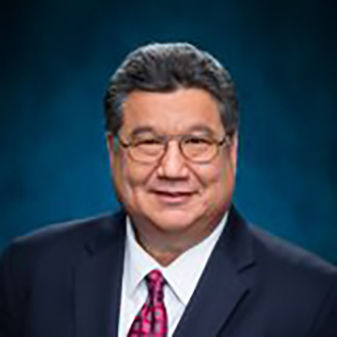2024 June Forum
Online Zoom
June 7, 2024
• • •
Midyear Legislative Review
The Senate Presidents’ Forum held an online session on June 7, 2024. Here at the midyear mark, senators were invited to discuss the success and challenges of their 2024 legislative sessions to date, and to share future policy goals. The conversation, moderated by SPF’s Tom Finneran, examined issues of the economy, energy, and other legislative priorities.
Remarks contributed by participating senate members have been summarized for the purposes of this report.
Senator Thomas Alexander
President of the Senate
South Carolina

ECONOMY:
-
Budget is a top priority for South Carolina and budget projections are currently on target.
-
The state enjoys a strong economy and is one of fastest growing states.
-
South Carolina’s port is thriving and its capacity is expanding.
-
Strong growth and full employment bring challenges such as adequate workforce, adequate workforce housing, and childcare support for working parents.
ENERGY:
-
Growth also brings challenges in the energy sector, including needs for more electricity generation capacity, grid upgrades, and accommodating EVs and data centers, which require substantial energy.
-
The challenge is to generate sufficient energy to provide the base load. The state has a mix of energy sources, including nuclear plants, which provide about 50% of state’s energy generation; however, two new nuclear plants have not been able to come online due to project overruns. Some coal plants have come offline, while a few are still operating. Natural gas is an emerging solution, along with some innovation for public/private collaborations on energy generation.
-
A special Senate committee has been formed to evaluate for short- and long-term energy policy proposals, and this committee is receiving bipartisan support.
HEALTHCARE:
-
The state is supporting a collaboration among three research institutions (Clemson University, Medical University of South Carolina and University of South Carolina) to create an Alzheimer's center, which is gaining national recognition.
-
Meeting mental health needs is a key concern post-COVID.
-
Legislation is currently stalled on consolidating siloed health agencies including services for mental health, alcohol and drug abuse, special needs, and needs of an aging population; however, the goal remains to bring these services together and avoid duplication of efforts.
Senator Ron Kouchi
President of the Senate
Hawaii

ECONOMY:
-
In January, there were concerns about declining revenues after the Maui fires, when no building permits were being issued and an unfavorable exchange rate for Japanese visitors limited their travel to Hawaii. It was a concern that these factors could produce a revenue shortfall.
-
However, by March, the Legislature got a positive revenue report and was able to revise income tax brackets for first time in 30 years, producing savings for taxpayers through 2030 of $3 billion. Additionally, the Legislature passed an excise tax exemption for doctors and dentists to better match their Medicare reimbursements and to keep them practicing.
INVESTMENTS:
-
The state is investing $1 billion to address affordable housing and infrastructure on Maui.
The Legislature contributed $135 million to employee retirement plans above the required amount and added $300 million to the Rainy Day Fund. -
However, collections have recently slowed, and projections are $65 million lower. As a result, the Governor may veto retirement and Rainy Day Funds investments and bring the budget back into balance.
INSURANCE CONCERNS:
-
The state has significant concerns over rising insurance costs for condos and homes. Hurricanes and flooding and summertime fires all contribute to high risk in Hawaii. There have been 4000% increases for condos on insurance; and some carriers have left the state. Without insurance, banks will not finance mortgages and transactions have to be in cash. This puts an even bigger burden on the currently tight housing market.
Senator Paul Newton
Senate Majority Leader
North Carolina

ECONOMY:
-
During the North Carolina’s two-year budget cycle, $29.8 billion was budgeted in Year 1 and $30.9 billion in Year 2. In this second year, the focus is on fine-tuning the budget with a limited scope of changes — in a so-called “short session.”
-
This year, the state enjoyed significant over-collections and excess revenues. There were $3.25 B excess revenues at start of year 1, and now $1 billion in over collections. This allowed the Legislature to reduce tax burdens, such as reduction of corporate and personal taxes to attract economic development, while revenues continue to grow. The next target to consider for reductions is the excise tax.
-
It is harder to allocate funds when there’s excess revenues due to conflicting priorities. Despite a Super Majority of Republicans in House and Senate, there is disagreement about how to allocate the excess. The House wants to spend the budgeted $30.9B plus $1B in excess and $1B in reserves, while the Senate takes a more Conservative approach. As a result of this lack of agreement, the Legislature’s session will continue through the end of June – this is not a “short” session—and the Legislature is unlikely to pass any policy bills until they come to budget agreement.
POLICIES:
-
Current policies focus on workforce housing, childcare, and water infrastructure.
-
The state is collaborating with South Carolina on water resources and energy to bring efficiencies for water quality permitting; and permitting for new fuel sources.
ENERGY:
-
There are 11 nuclear plants that NC and SC operate as a single system. The goal is to create the most cost-effective and reliable system; and, in fact, the state enjoys lower-than-average electric rates. The state also has many data centers that consume significant energy. Currently, Duke Energy has a Memorandum of Understanding with Google and others to create new tariffs that are fair to data centers and to existing customers.
DEVELOPMENT:
-
The state has an embarrassment of riches in new economic development. For example, Toyoto invested $13.9 billion to build one plant. The state seeks to create an environment to attract companies, who can be assured they will see a 50–100 year opportunity horizon.
Senator T.J. Shope
Senate President Pro Tempore
Arizona

ECONOMY:
-
Arizona had a budget deficit at start of session, and negotiations on budget caused the legislative session to extend into June. With a one-seat Republican majority in the House and Senate and a Democratic Governor, the legislative and executive branches are figuring out how to work together in a friendlier and more cooperative exchange.
-
The Legislature will have to make budget cuts, but some allocations will remain intact including K-12 education and infrastructure spending.
-
The Legislature is trying to wrap up its session by June 30 before an alleged “Pay to Play” investigation of the Governor interferes with completing the work of the Legislature.
ENERGY:
-
Given the state’s hot climate, energy sufficiency and continual grid improvements are important. People want cheap rates, but power generation and transmission lines require maintenance and upgrades.
-
Current energy sources in the state are pretty robust, with mixed sources of energy: the Palo Verde nuclear power plant is the largest in country, plus the state utilizes natural gas, wind, and solar sources as well. There has been expansion of hydropower dams and transmission lines, but the risk of drought in a dry climate is a concern for hydropower.
-
However, this year, drought was not an issue and reservoirs are above 90%, requiring some planned releases. Still, there is continued collaboration between the utility and federal agencies on expanding the dams to increase capacity for future needs and future dry seasons. Conservation efforts have proved effective; today there are 7.5 million people in the state versus 1 million in 1950 and yet today less water is used.
Senator Martin Looney
Senate President Pro Tempore
Connecticut

ECONOMY:
-
The Connecticut Legislature reallocated American Rescue Plan Act (ARPA)
money to higher education, childcare, and childhood mental health services, but that money will not be available for future budgets. -
The state has seen an increase in child mental health issues since COVID. Many providers only see children if families can pay out of pocket because insurance reimbursement is not adequate. Now the Legislature is helping to fund child mental health services and adjusting Medicaid rates to offer better reimbursements.
-
The Legislature has funded daycare and pre-school programs to prepare children for school and avoid their becoming disengaged and alienated.
In Connecticut, the state pays all municipal teachers’ pensions. The Legislature made significant progress in funding underfunded state and teacher pension systems. -
The state’s Budget Reserve Fund is up to 15% of the General Fund.
ENERGY:
-
The state has a diverse portfolio of power sources with investments in renewable energy, including offshore wind and solar, along with natural gas and one nuclear plant.

